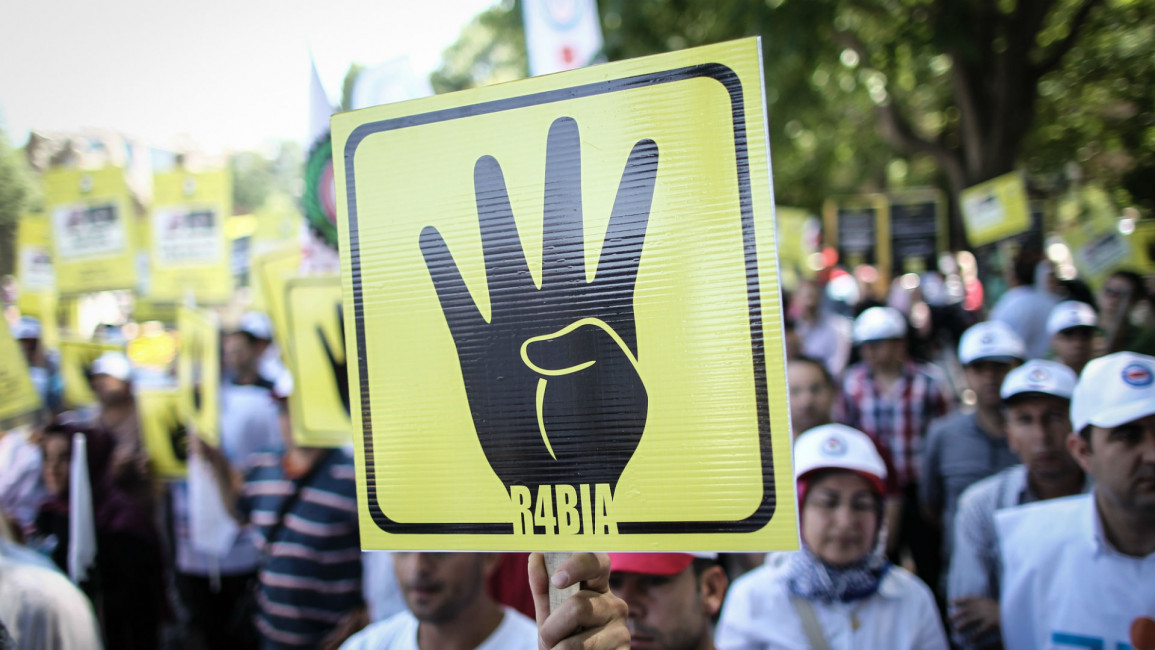
Rabaa massacre: Two years later, and still no closure
My own sporadic strolls through Rabaa Square in the summer of 2013 were driven as much by social curiosity, as they were by the professional drive of a journalist to be in the middle of a major event.
The first thing I remember, for some reason, was a slightly comical picture of the recently deposed Mohamed Morsi with the word "LEGITIMATE" written underneath. Parts of the place stunk of an over-used, under-cleaned mosque lavatory.
At night, everyone got up to pray taraweeh, the night-time Ramadan prayers. A disturbing number of families had seemingly relocated to a single tent at the middle of the intersection.
I sat and spoke to many people. Many believed that this was it - their time to make a stand in the name of God, and had the accompanying bland smile of the religious zealot.
Others were there because they just thought that removing Morsi meant a return to despotic military rule. They had the determined look of those who took a stand based on principle. Most thought that they were building a social momentum that would eventually lead to victory, a la 25 January 2011.
The reality was that they were living in a bubble, one that they nurtured and inflated, regardless of what was happening outside.
Unlike 25 January, the mood in the rest of the country was not sympathetic.
The backdrop to these discussions was the highly audible single stage where many spoke of peaceful resistance, and other rabble-rousing preachers spoke of jihad and preparing to die for a cause.
Despite some testy conversations, I never felt threatened by anyone at this sit-in, even when they knew I felt the Brotherhood betrayed the revolution while in power.
However, this was not a universal experience. But none of the individuals I met were fundamentalist terrorists using the sit-in as a training ground. While I disagreed with nearly everyone there, I cannot bear to fathom the horrors that many of them saw on August 14, 2013.
| None of the individuals I met were fundamentalist terrorists using the sit-in as a training ground |
It doesn't sit right that the memory of the massacre at Rabaa and AlNahda Square creates so much controversy and splits as many opinions as it does.
Whatever else is said, whether the death toll is 638 or 868, one truth stands above all other quantitative nitpicking or dismissive politicisation: it is the worst massacre of civilians in Egypt's modern history.
Rabaa became a rallying call and symbol for the Muslim Brotherhood - and other Islamist groups - and as a result, the commemorative Rabaa movement became outlawed by the authorities, who considered it a symbol of allegiance to the Brotherhood.
Two years on, and the memory of the massacre - even the word "Rabaa", the name of a Sufi saint and poet of divine love to whom a nearby mosque is dedicated - seem to be as much a dagger in the heart of those who were directly affected by it, as it is a thorn in the side of the regime.
August 14, 2013 is the darkest of black marks in Egypt's recent history - first and foremost because of its unmatched brutality and heartlessness, and the callous politicisation of the deaths on the day.
Whether it is used as a rallying cry for the ludicrous assertion that Morsi will ever be politically present again, or for the justification of acts of brutality in the war on terror, the political ways in which Rabaa has been invoked - or gagged - only serves to further alienate society from the reality that a major human catastrophe occurred, one of many since 2011 (albeit the most severe), and it leaves a gaping wound in the fabric of society that desperately needs medical treatment.
Two years on, the country should be looking for closure, if only to assure the value of human life in Egypt.
| Two years on, the country should be looking for closure, if only to assure the value of human life in Egypt |
A fact-finding commission placed the majority of the blame of these deaths on the Islamists and demonstrators themselves, which runs counter to many first-hand accounts of the incidents.
While this case of human injustice remains unsolved, hundreds of other cases since January 2011 - and especially during the two years since the Rabaa massacre - also remain open and unresolved.
Human rights reports point to a worsening situation while criticising the disproportionate use of force by police to crackdown on "illegal" protests with minimal legal recourse against those accused of transgression.
The Rabaa sit-in was a nuisance. As a resident of the area, I was infuriated by their choice of location.
Like many others who were inconvenienced, a part of me felt that maybe they need to be forcibly removed, to bring life back to "normal". However, normality has not been the order of the day for more than four years.
Like any demonstrating group in Egypt, the majority of the demonstrators I talked to deserved a conversation, not the ultimate use of force.
Rabaa has ultimately become a further confirmation that in the current security-driven climate in Egypt, grieving families will seldom see justice - and the iron-fist that will clobber dissent will do so more indiscriminately.
If that is what facets of the security force are striving for, perhaps closure is the last thing on their mind.
Mohamed ElMeshad is a journalist and a PhD candidate at SOAS. His research interests focus on the political economy of the media. Recently, he contributed to the Committee to Protect Journalists' book, Attacks on the Press (2015).
Opinions expressed in this article remain those of the author and do not necessarily represent those of al-Araby al-Jadeed, its editorial board or staff.




